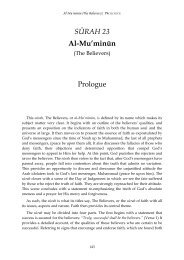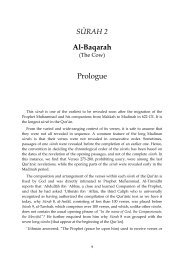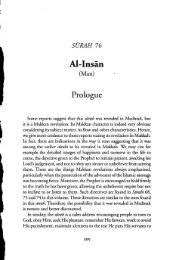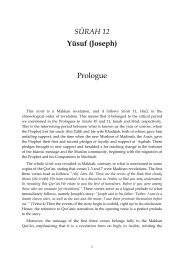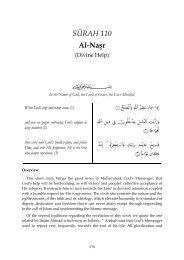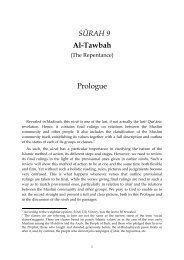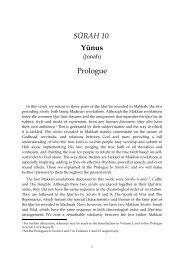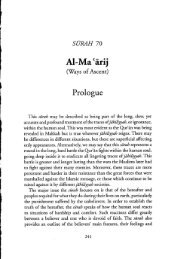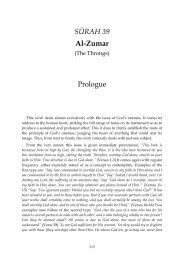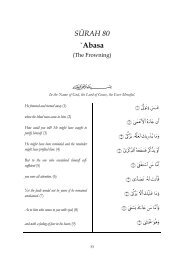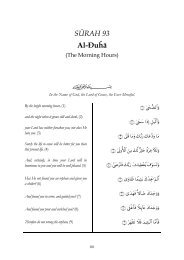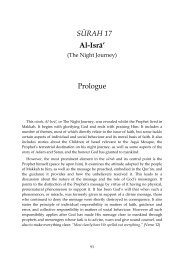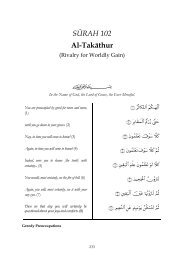31) Luqman - TAFSIR FI ZILAL AL-QURAN
31) Luqman - TAFSIR FI ZILAL AL-QURAN
31) Luqman - TAFSIR FI ZILAL AL-QURAN
Create successful ePaper yourself
Turn your PDF publications into a flip-book with our unique Google optimized e-Paper software.
Luqmān | GOD’S ABSOLUTE KNOWLEDGE<br />
male or a female, even at the moment when no one can have any knowledge of this,<br />
at the time when the female egg is fertilized. He further knows the features the foetus<br />
will have, its characteristics and future abilities. All this is part of God’s exclusive<br />
knowledge.<br />
“Whereas no one knows what they will earn tomorrow.” (Verse 34) No one knows what<br />
will happen to them tomorrow: good or bad, benefit or harm, ease or hardship,<br />
health or sickness, obedience to God or disobedience. ‘Earning’ is far more general<br />
than material gain. It applies to everything that happens to a person tomorrow,<br />
which is kept hidden under thick covers. People may try to discover this, but they<br />
will always fail, remaining unable to discern anything beyond those covers.<br />
Similarly, “No one knows in what land they will die.” (Verse 34) Such knowledge is<br />
kept behind thick blinds which cannot be penetrated by hearing or seeing.<br />
As human beings we stand before these covers acknowledging our weakness and<br />
limited knowledge. Thus, the arrogance of assumed, penetrative knowledge is thus<br />
seen for what it is. We realize that, compared with what is withheld from us, our<br />
knowledge is indeed limited. Even when human knowledge achieves all that it can,<br />
there remains a great deal about which we do not know. We will always remain<br />
blind to what happens tomorrow, or even in the next moment. With such realization,<br />
humans should reduce their arrogance and submit to God.<br />
The sūrah presents these highly effective notes against an expansive backdrop of<br />
time and place, the present, the near future, the great realm that lies beyond our<br />
perceptions, our thoughts and imaginations. This background includes the Last Hour<br />
that seems so distant, rain which originates far away, wombs and their hidden<br />
contents, what is earned tomorrow which is close in time yet remains unknown, and<br />
our place of death and burial which is driven away in our thoughts. Although the<br />
background is expansive, the Qur’ānic style gathers it from its broad perspective so<br />
that it comes close and points to God’s hidden knowledge. Thus we stand as though<br />
we try to look through a peephole, but find it blocked. Should even a tiny opening be<br />
made in it, what is behind is in the same position as what is before it. It remains<br />
closed to man because it is beyond human ability and knowledge. It continues to<br />
belong exclusively to God. None knows anything about it except by His permission<br />
and according to the measure He determines. “God alone is omniscient and takes<br />
cognisance of all things.” (Verse 34)<br />
Thus the sūrah concludes and we feel that it has taken us on a very long journey to<br />
distant worlds and horizons. Our hearts return in a slow move after traversing such<br />
great distances. Our minds are heavy with thought and reflection on what we have<br />
seen of worlds beyond worlds. Yet it is a sūrah made of just 34 verses. All glory<br />
belongs to God, the Creator of hearts. He has bestowed this Qur’ān on us which heals<br />
349



